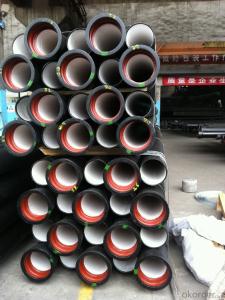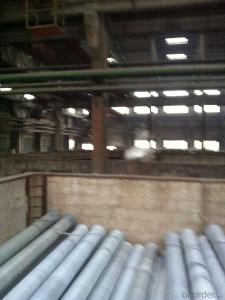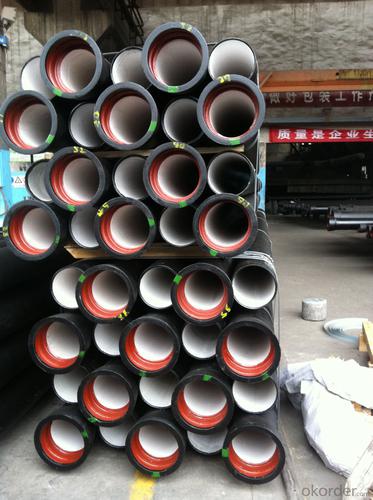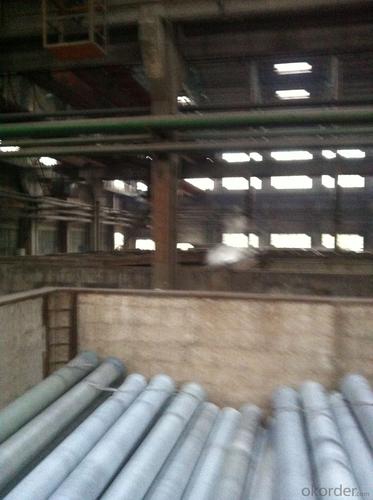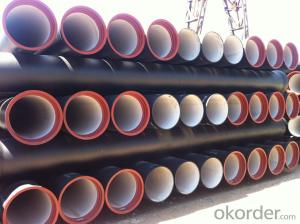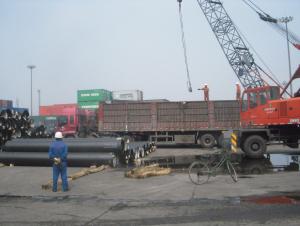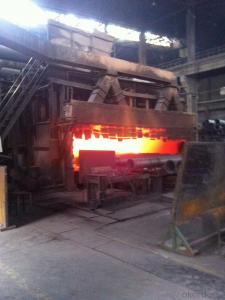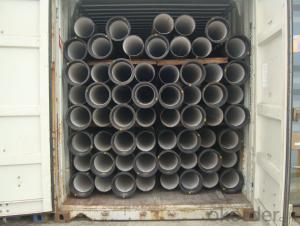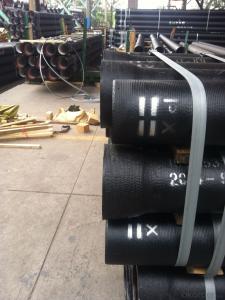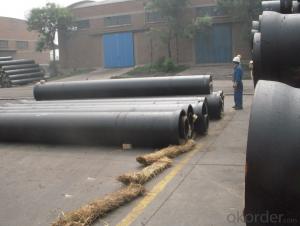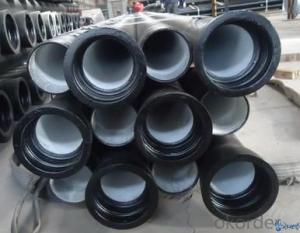DUCTILE IRON PIPEs K8 CLASS DN1000
- Loading Port:
- Tianjin
- Payment Terms:
- TT OR LC
- Min Order Qty:
- 32 pc
- Supply Capability:
- 3000 pc/month
OKorder Service Pledge
OKorder Financial Service
You Might Also Like
· Material : Ductile Cast Iron
· Size Range : DN 80mm to DN 2000mm
· Unit Effective Length : 6m or 5.7m
· Manufacture Standard: ISO 2531:1998/ EN 545:2006/EN 598:2007
· Annual capacity : 200,000 tons
· Coating Exterior: Zinc 130g/m2 according to ISO 8179-1 and bitumen coating 70 microns.
· Cement Interior: Portland Cement/ High Alumina Cement/ Sulphate Resisting Cement Lining according to ISO 4179
· Special requirements on external coating and internal lining can be applied
· We also provide accessories such as SBR/EPDM rubber gaskets, lubricant paste, pipe caps, PE sleeves, etc.
Additional Parts:
Each pipe is strictly inspected according to related standard to ensure permanently high performance.
Easy Installation at site and service free for life
Long Service Lifespan
Quotation will arrive you within 24hours once we get your inquiry.
We guarantee offering you a competitive price.
A copy of original inspection reports of pipes will be offered after shipment.
Photos of loading process will be sent to the customer after shipment effect.
We will follow-up the delivery progress after shipment effect and update to the customer on weekly basis.
- Q: An urban infrastructure construction, water supply pipe is ductile iron pipe and PE pipe, thank you
- Because the construction of municipal water supply pressure will be relatively large, generally used in the selection of pipe centrifugal ductile iron pipe, he has properties of iron essence and steel, excellent corrosion resistance, good ductility, good sealing effect, simple installation, ductile iron pipe is mainly used for municipal, industrial and mining enterprises, water supply, gas, oil etc.
- Q: What's the difference between grey cast iron pipe and ductile iron pipe?
- Spheroidal graphite cast iron and ordinary cast iron contain graphite monomer, that is to say, cast iron is a mixture of iron and graphite. The graphite in ordinary cast iron is flaky, and the strength of graphite is very low, so there are many flakes of voids in the cast iron, so the strength of ordinary cast iron is lower and more brittle. Graphite in graphite cast iron is spherical, equivalent to the existence of many spherical voids in cast iron. The effect of spherical voids on the strength of cast iron is much smaller than that of sheet voids, so the strength of nodular cast iron is much higher than that of ordinary cast iron.
- Q: What is the expected deflection range for ductile iron pipes?
- Several factors, such as pipe diameter, wall thickness, soil conditions, and installation methods, can affect the expected deflection range for ductile iron pipes. Compared to materials like PVC or concrete pipes, ductile iron pipes generally have a higher deflection capacity. For ductile iron pipes with smaller diameters (up to 12 inches), the typical expected deflection range is around 2-3% of the pipe diameter. In other words, a 12-inch ductile iron pipe could potentially deflect by approximately 0.24-0.36 inches. On the other hand, larger diameter ductile iron pipes (greater than 12 inches) can have a slightly higher expected deflection range, ranging from 2-5% of the pipe diameter. For instance, a 24-inch ductile iron pipe could potentially deflect by approximately 0.48-1.2 inches. It is important to remember that these values are general estimates and should be confirmed with the manufacturer's specifications or engineering design guidelines specific to a particular project. Furthermore, following proper installation techniques and backfilling practices is crucial to ensure the structural integrity of the pipe and prevent excessive deflection.
- Q: Are ductile iron pipes suitable for hydroelectric power plants?
- Indeed, hydroelectric power plants can benefit from the suitability of ductile iron pipes. Renowned for their robustness, endurance, and adaptability, ductile iron pipes prove to be an optimal selection for a variety of water industry applications, including hydroelectric power plants. These pipes exhibit the ability to endure substantial pressure and resist corrosion, thereby ensuring their appropriateness for the conveyance of water throughout the various stages of hydroelectric power generation. Moreover, the extended lifespan of ductile iron pipes and their minimal maintenance requirements effectively reduce the overall operational expenses associated with power plant maintenance. Consequently, ductile iron pipes emerge as a dependable and fitting choice for hydroelectric power plants.
- Q: Are ductile iron pipes suitable for installation in areas with high traffic loads?
- Yes, ductile iron pipes are suitable for installation in areas with high traffic loads. Due to their inherent strength and durability, ductile iron pipes can withstand heavy loads and are commonly used in applications where there is significant vehicular traffic.
- Q: Can ductile iron pipes be used for geothermal heating and cooling systems?
- Yes, ductile iron pipes can be used for geothermal heating and cooling systems. Ductile iron pipes are known for their strength and durability, making them suitable for underground applications like geothermal systems. They can withstand the high temperatures and pressure variations associated with geothermal heating and cooling, making them a reliable choice for this purpose.
- Q: How does ductile iron pipe handle changes in pipe diameter or size?
- Ductile iron pipe offers a convenient solution for dealing with alterations in pipe diameter or size. Its excellent flexibility and capacity to adapt to changes in pipe dimensions without compromising its structural integrity are a result of its unique composition, which contains a significant amount of graphite nodules that provide ductility and elasticity to the material. When faced with adjustments in pipe diameter or size, ductile iron pipe can be easily manufactured or modified to meet specific requirements. It can be cast or fabricated in different diameters and lengths, allowing for seamless integration and adaptability within a pipeline system. This versatility proves particularly advantageous when connecting different pipe sizes or making alterations to the pipeline layout. Furthermore, the superior mechanical properties of ductile iron pipe enable it to withstand the stresses and forces associated with changes in pipe diameter or size. It possesses high tensile strength, impact resistance, and durability, ensuring its ability to handle the internal and external pressures exerted on the pipe during operations. Moreover, the jointing systems employed with ductile iron pipe contribute to its ability to handle changes in diameter or size. Various joint types, including push-on, restrained, or mechanical joints, provide secure and leak-free connections between different pipe sections. These joints facilitate easy assembly and disassembly, enabling efficient adjustments to the pipe diameter or size as required. In conclusion, ductile iron pipe is well-equipped to handle changes in pipe diameter or size due to its inherent flexibility, adaptability, and robustness. Its composition, manufacturing capabilities, and jointing systems all contribute to its capacity to accommodate variations in pipe dimensions without compromising its performance.
- Q: What is the typical diameter range of ductile iron pipes?
- The typical diameter range of ductile iron pipes varies depending on the specific application and industry standards. Generally, ductile iron pipes come in a wide range of diameters to accommodate various needs. In water distribution systems, the typical diameter range can vary from as small as 3 inches (76 mm) to as large as 64 inches (1626 mm) or even larger. For sewer and wastewater systems, the typical diameter range is usually between 4 inches (102 mm) to 48 inches (1219 mm). However, it is important to note that these ranges are not exhaustive and there may be instances where ductile iron pipes are available in sizes outside of these common ranges. It is always advisable to consult industry standards and specific project requirements to determine the appropriate diameter range for ductile iron pipes.
- Q: What are the different corrosion protection options for ductile iron pipe?
- To ensure the longevity and durability of ductile iron pipes, there are several options available for corrosion protection. These options are as follows: 1. Cement Mortar Lining: A layer of cement mortar is applied to the inner surface of the pipe, creating a barrier against corrosive elements in water or soil. This lining offers excellent corrosion resistance and can endure for many decades. 2. Polyethylene Encasement: The ductile iron pipe is wrapped with a layer of polyethylene material, which acts as a physical shield against external corrosive elements. This method is commonly employed in aggressive soil conditions and provides long-lasting protection. 3. Internal and External Coatings: Different types of coatings, such as epoxy, polyurethane, or fusion-bonded epoxy (FBE) coatings, can be applied to the inner and outer surfaces of the pipe to resist corrosion. These coatings form a barrier that prevents the pipe from corroding in the surrounding environment. 4. Cathodic Protection: An electrical current is utilized to safeguard the pipe from corrosion. Cathodic protection systems can be either galvanic (sacrificial anode) or impressed current systems. These systems control the flow of electrons, preventing the oxidation of the ductile iron pipe. 5. Zinc Coating: Also known as galvanizing, this method involves applying a layer of zinc to the surface of the ductile iron pipe. Zinc acts as a sacrificial anode, corroding instead of the iron pipe. Zinc coating is particularly effective in soil conditions with low resistivity, offering reliable corrosion protection. It is crucial to consider various factors such as the environment, water chemistry, soil conditions, and expected service life when choosing a corrosion protection option for ductile iron pipes. Consulting with corrosion protection specialists and engineers can assist in selecting the most suitable option for specific applications.
- Q: Are ductile iron pipes resistant to UV radiation?
- Ductile iron pipes do not possess resistance against UV radiation. The exposure to UV radiation can lead to the deterioration and weakening of the material as time goes by. In order to safeguard ductile iron pipes from UV radiation, they must be covered or enveloped with a UV-resistant substance or coated with an appropriate protective layer. Furthermore, it is essential to conduct regular inspections and maintain the pipes adequately to identify and rectify any indications of UV damage.
Send your message to us
DUCTILE IRON PIPEs K8 CLASS DN1000
- Loading Port:
- Tianjin
- Payment Terms:
- TT OR LC
- Min Order Qty:
- 32 pc
- Supply Capability:
- 3000 pc/month
OKorder Service Pledge
OKorder Financial Service
Similar products
Hot products
Hot Searches
Related keywords
